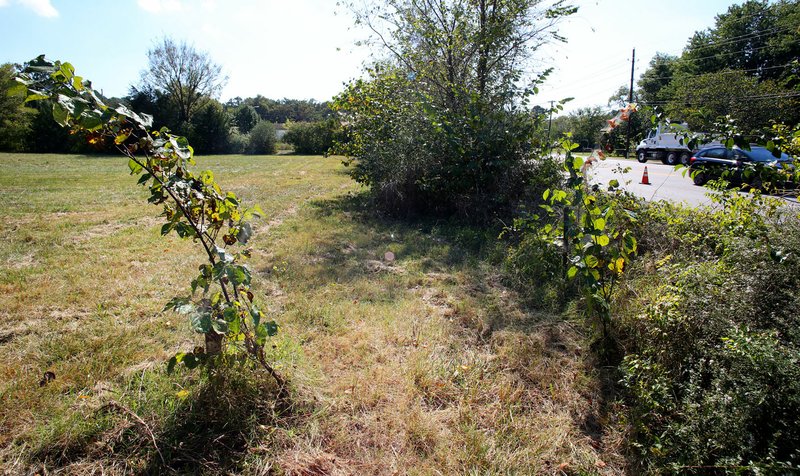FAYETTEVILLE -- An emergency shelter project would provide temporary housing for several homeless residents living in tents on the south part of town but planning commissioners want revisions to the plan before approving permits to build.
New Beginnings Community would serve as a transitional housing project on about 5 acres just south of 19th Street at South School Avenue. The property, currently under the ownership of the University of Arkansas, Fayetteville, sits right next to 7 Hills Homeless Center.
Next meeting
When: 5:30 p.m. Oct. 23
Where: Room 219, City Hall, 113 W. Mountain St.
Kevin Fitzpatrick, director of the university's Community Family Institute, first had the idea for New Beginnings about five years ago, he said. Fitzpatrick sits on the board of ServeNWA, a nonprofit dedicated to several programs that tackle food insecurity and basic community needs, which has spearheaded the project.
Dozens of people live in the woods east of South School Avenue. The university owns 30 more acres right next to where New Beginnings wants to build, in addition to about 20 more acres just to the north.
At least two deaths were reported this year at makeshift encampments on the university land. In January, the Community Family Institute found 87 unsheltered people living there. Fitzpatrick, noting the count was done in the dead of winter, estimated a more realistic number at double that amount.
The first phase of the campus would bring 15-20 shelters, each about 200 square feet, to the site. Organizers say a number of contractors have offered to build simple, A-frame structures with minimal electricity, possibly solar-powered. Fire pits would go outside in a communal cooking area.
Fitzpatrick said the plan initially would include portable or compostable toilets with the possibility of sewer hookups in later phases. Project organizers have been in talks with city officials to bring water to the site and trash and recycling service, he said. A manager would live on-site and Fayetteville officers could play a community policing role.
A second phase would consist of a 1,000-square-foot community center and office space. A potential third phase would involve additional shelters.
A land sale between the university and the nonprofit is pending. So far, the nonprofit has privately raised about three-fourths of what it might need to get the project going, although several unknowns make that number hazy, Fitzpatrick said. A public funding phase will open as the project progresses, he said.
ServeNWA wants to partner with regional organizations to provide services to the potential residents at New Beginnings. Jessica Andrews, who was announced last week as new 7 Hills chief executive officer, said her staff recently met with ServeNWA to go over details on the project.
"Homelessness is a complicated issue and this project serves an emergency shelter need in our community," she said. "I'm looking forward to learning more as the project evolves."
Residents at New Beginnings would live there for 30-120 days with a goal of moving to permanent housing elsewhere, Fitzpatrick said. The campus hopes to emulate microshelters in Austin, Texas, and Eugene, Ore.
"There's no reason to think that a person can go from the woods, living in the conditions that they're living in, and just leapfrog over everything into an apartment or house," Fitzpatrick said. "It's just not going to happen. And if it does happen, it's not going to be successful."
Two neighbors to the property spoke against the proposal Monday, saying they already struggle with people in the encampments causing problems.
Planning commissioners 9-0 tabled the item for two weeks, asking for a more clearly designed layout. The sporadically placed shelters could lead to disputes inside the camp, commissioners said. Also, the fence surrounding the campus has jagged edges to the south, which could lead to issues with people living outside the camp, they said.
Commissioners also wanted a firmer plan on toilets for the site.
NW News on 10/10/2017

